a Natural, Authentic, and Exquisite Quality EXTRA VIRGIN OLIVE OIL?
100% Original Sicilian
Extra Virgin Olive Oil
the 5 phases of the RibEVO Protocol :
- Fertilization and Natural Cultivation
- Manual Selection and Harvesting of Olives
- Cold Extraction
- Natural Decantation and Transfer
- Direct packaging in Bag-in-Box


by the magic of true Sicilian Extra Virgin Olive Oil
Who (not) to buy oil from
When searching for extra virgin olive oil to buy, you often find yourself in one of these situations:
1) Standing in front of the supermarket shelf;
2) Browsing online with thousands of advertisements from various websites;
… but unfortunately, these scenarios come with their own issues.
1. Supermarket oil
Recent investigations by regulatory authorities have shown through laboratory analyses that at least half of the oils found in supermarkets are the result of food fraud and are, therefore, fake extra virgin olive oils.
Major brands (even the most well-known ones) should be avoided regardless of their origin because they sell oxidized, flavorless oils.
In these cases, oxidation is intentionally used to produce flavorless oils that appeal to the mass of less discerning consumers who buy based solely on price, disregarding the quality of what they are consuming.
2. Online Sellers
Most online sellers are not olive oil producers, and if they are, they often make large offers without providing any guarantees or detailed explanations of their production process.
Unfortunately, food fraud is increasingly common in this sector. Counterfeiting exposed by regulatory authorities is a daily occurrence, especially among sellers and well-known brands that, in their quest for higher profits, blend extra virgin olive oil with seed oils to produce a counterfeit extra virgin olive oil.
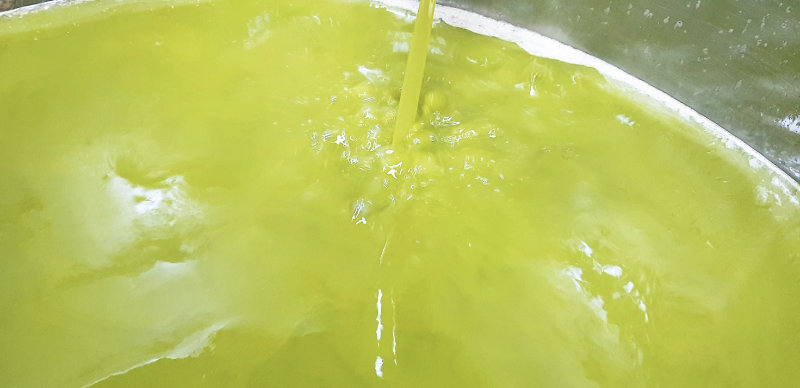
And so, you, the consumer, are deceived because you can’t even trust what’s on the label— it might be completely false.
Besides the financial loss of buying something at a price that should have been much lower, the bigger issue is cooking and seasoning your dishes with a neutral, flavorless, or even unpleasant oil that might also be hazardous to your health due to unregulated raw materials and prohibited additives.
You believe you’re buying a healthy and genuine oil, but in reality, you’re putting your health and that of your loved ones at risk.
However, there are many misconceptions and unknowns that hinder you from bringing a quality oil to your table.
The average consumer has limited awareness of this product and tends to choose oil with little attention.
Let’s work together to debunk these myths…
Quantity is not synonymous with Quality
When it comes to extra virgin olive oil, Spain inevitably comes up as the world’s largest producer, boasting 272 olive varieties, though only three account for 60% of the production.
You should know that the Iberian Peninsula specializes in producing “quantity,” resulting in mass-market oils through intensive, industrial methods that rarely compete in terms of sensory excellence.
One-third of the global extra virgin olive oil production comes from a single Spanish variety, the Picual. This translates to poor biodiversity and limited sensory and flavor profiles.
Another country worth mentioning is Greece, which has just 52 olive varieties, with three varieties representing 90% of the production. Biodiversity here is also limited, and recent studies have raised concerns about pesticide residues in many oils, casting serious doubts on consumer safety. Moreover, food fraud and adulteration cases are common.
This doesn’t mean there aren’t high-quality products from these countries, but such cases are rare exceptions, representing less than 1% of the total production. Hence, it’s quite challenging, if not nearly impossible, for them to reach your table, and it’s important for you to be aware of this.
In contrast, Italy generally produces better and higher-quality extra virgin olive oil. Why?
First and foremost, because of biodiversity.
Italy has an incredibly RICH and UNIQUE olive heritage with over 530 olive varieties (double that of Spain). This offers unparalleled sensory and nutritional richness and makes our plants more robust and resilient to diseases and climate changes. This diversity enables us to produce oils with unique and inimitable flavor profiles.
In Italy, there aren’t large-scale production facilities like in other countries where a few entities monopolize the market.
Most production is managed by thousands of small-scale olive growers who, producing less oil, can focus more on quality compared to the high-volume producers in Spain and Greece.
Moreover, Italy has the strictest production regulations in all of Europe, aimed at ensuring quality and protecting the environment and health.
However, keep in mind that even Italian supermarket brands should still be avoided.
Difference between olive oil and extra virgin olive oil
Most people, and perhaps even you, may not know the difference between olive oil and extra virgin olive oil.
To put it simply, extra virgin olive oil is an oil extracted directly from olives using mechanical processes, free from sensory defects, and with an acidity level not exceeding 0.8%.
Olive oil (no EVOO), on the other hand, is a blended oil made from very low-quality oils with poor organoleptic characteristics. These oils undergo a series of chemical treatments to correct unpleasant odors and flavors, making them more neutral.
Subsequently, these are mixed with a small amount of extra virgin olive oil and marketed as regular olive oil. In cases of food fraud, they may even be sold as extra virgin olive oil when they are not.
Is the color of oil really that important?
Some people are influenced by color and might think that an oil with a greenish hue is of higher quality compared to a more yellow one, but this is not the case.
In fact, this misconception is exploited by fraudsters who use coloring agents to make low-quality oils look more appealing.
In professional analysis, color is not a criterion for determining oil quality because it does not reveal much about its quality and can even mislead consumers.
That’s why professional tasters use blue tasting glasses that prevent them from seeing the color.
A green oil will simply contain more chlorophyll, while a yellow oil will have more carotenoids, which are natural pigments that give the oil its color.
Color is only important for assessing degradation – when you notice abnormal hues like reddish or brownish shades, it indicates strong oxidation and rancidity.

The oil that stings in the throat
One common phrase you often hear from the less experienced is: “This oil tickles my throat, it’s acidic and I don’t like it at all”.
People frequently confuse the pungency of extra virgin olive oil with acidity.
The truth is that the sensation of pungency is not related to acidity.
Acidity is not perceptible to the taste; to detect and measure it, a specific laboratory analysis is required. It is only significant when accompanied by peroxide values, which indicate the oil’s oxidation state.
On the other hand, the “burning” sensation that envelops the palate and throat is a sign of a healthy, fresh, and genuine product… rich in antioxidant compounds.
Indeed, pungency is considered one of the three “positive attributes” of extra virgin olive oil, according to the International Olive Council, along with fruitiness and bitterness, which together define the delicacy of a high-quality oil.
However, if no expert has ever taught you how to recognize quality oil, you might never know if what you’re consuming is genuinely good—because you lack a benchmark.
Producing high-quality extra virgin olive oil is challenging because various factors affect the final quality throughout the entire production process.
From cultivating the trees in the fields to storing the liquid in specialized containers, numerous elements influence the flavor, aroma, and nutrient content of the oil.
The benefits of oil
While some oils are merely seasonings, others are true foods with nutritional properties.
High-quality extra virgin olive oil is a treasure trove of antioxidants, making it a genuine elixir of longevity:
- Heart Health: It’s excellent for the heart and the entire cardiovascular system.
- Powerful Anti-Inflammatory: It has strong anti-inflammatory properties.
- Brain Health: It helps keep the brain young.
- Oxidative Stress Protection: It protects against oxidative stress.
- Skin Care: It gives the skin a soft, elastic texture.
- Numerous Other Benefits: And it offers many other advantages.
It is a health-boosting food like no other. Combining all these attributes within a single natural plant substance is a unique feature of extra virgin olive oil.
In nature, no other plant-based product provides flavor to our dishes while concentrating all these immense benefits…
… It’s something extraordinary that science has thoroughly proven and recognized but still needs broader dissemination.
However, be cautious: not all oils possess these properties. Such benefits are exclusive to high-quality extra virgin oils produced through specific methods.
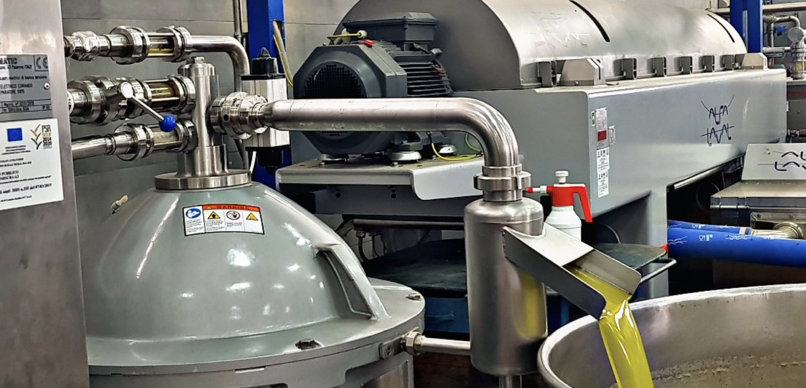
How to recognize quality extra virgin olive oil without expensive lab tests, even if you’re not an expert?
Sensory analysis
The first fundamental step in determining if an oil is of good quality is to trust your senses.
When tasting, even less experienced individuals should be able to recognize these three essential characteristics:
- Fruitiness: This refers to the range of olfactory sensations that remind you of the olive fruit and vegetal notes, which can vary in intensity.
- Bitterness and Pungency: These are due to the presence of polyphenols, indicating a high-quality oil rich in antioxidants.
- Absence of Defects: Ensure that there are no unpleasant odors or flavors.
Of course, this sensory analysis can only be performed after you’ve purchased the product…
So, how can you assess quality before buying?
What to ask the seller before buying extra virgin olive oil
To ensure you’re buying good oil, you should first approach a genuine producer.
Avoid retailers, supermarkets, and mills that don’t have their own land—also steer clear of amateur producers like acquaintances or relatives. Instead, choose experienced and qualified producers who can guarantee control over all stages of production.
Ask them about:
- Production Methods: How is the oil produced?
- Plant Protection: How do they protect the trees from pests?
- Harvesting: What criteria are used, and when and how is the harvest conducted?
- Olive Varieties: What varieties of olives are used?
- Extraction Process: What is the process of extraction?
- Analysis and Storage: Have they analyzed the oil, and how do they store it?
You should conduct a thorough inquiry.
By asking these questions and evaluating how they are answered, you can quickly determine whether you’re dealing with a genuine professional or a fraudster...
… In fact, 90% of people who claim to be producers cannot even answer these simple questions and will tend to provide vague responses, claiming it’s good just because they made it—often selling it at lower-than-average prices for a reason.

Why Award-Winning Oils aren’t Always a Guarantee of Quality
Here’s another little-known truth: winning a competition doesn’t necessarily mean being the best.
Award-winning oils in contests and competitions don’t always guarantee quality.
In fact, the evaluation criteria can vary widely and are often subjective, influenced by the personal preferences of the judges.
Moreover, marketing campaigns can distort perception, giving an advantage to brands with greater financial resources to promote their products.
Another factor to consider is storage. Extra virgin olive oils are delicate products that can deteriorate quickly if not stored properly.
The oil that wins a prize often doesn’t retain the same characteristics by the time it reaches store shelves. Additionally, subsequent batches may not match the same quality, especially if production is ramped up to meet growing demand.
You’ve Already Significantly Boosted Your Knowledge About Olive Oil—Well Done!
If you’ve made it this far, I have to congratulate you. You’re now a far more discerning and informed consumer than the average person…
…these insights, which I assure you are rarely shared elsewhere, are enough to help you spot and avoid more than half of the fake extra virgin olive oils out there. But I want to give you even more…
Your journey to becoming an expert on olive oil doesn’t end here. Stay tuned, because what comes next will further elevate your ability to choose the finest oil for your table.
The absolute best way to truly understand if an olive oil is of high quality is to have a solid grasp of the basics of the raw materials…
…and that’s why I’ve decided to give you a summary of the various stages of how I produce a premium extra virgin olive oil, so pay close attention!
But first, let me introduce myself…
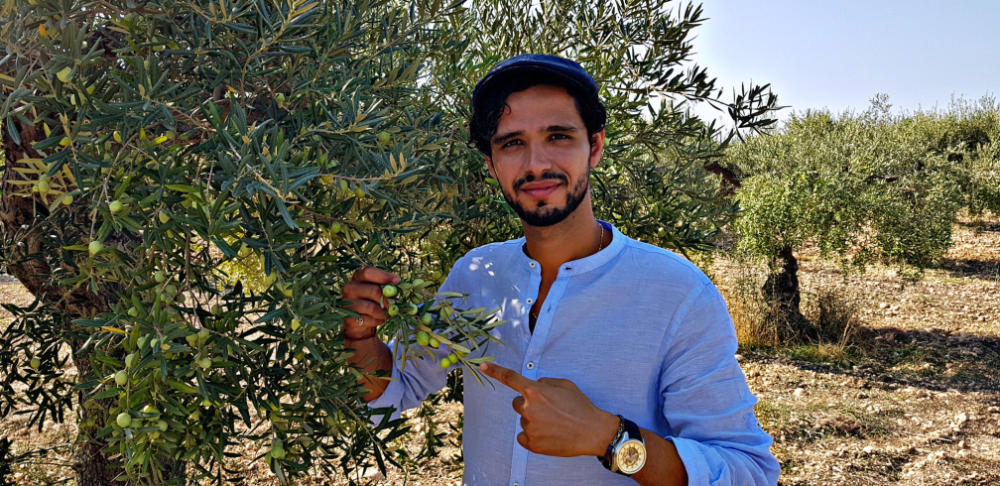
My name is Giorgio Marretta, and I am a young biologist from Sicily, born and raised in the beautiful countryside of Ribera, in the province of Agrigento, Sicily.
In this fertile land, blessed by the sun, I spent my childhood helping my family with various tasks in the fields during my free time.
We had a small farm where we produced olive oil and oranges.
Among the many activities in the countryside, my favorite was olive harvesting—a wonderful, magical, and exciting moment that left me in awe year after year.
I loved breathing in the aroma of those fruits, and I couldn’t wait to run to the mill to witness that exquisite liquid that the olives would give us.
During the harvest season, the olive groves became my playground, where I watched with amazement and curiosity as the skilled hands of my grandfather and father gently picked the fruits from the trees with long combs.
Day by day, year after year, I carefully learned the secrets of their movements.
My love for nature and its fruits, along with my desire to understand the magical cultivation of olives more deeply, led me to move to northern Italy at the age of 18 to attend university, where I earned my degree as a biologist.
My studies enriched my knowledge of the science and specifics of olive oil and nutrition.
However, at the end of that journey, the call of my homeland was too strong.
I wanted to put into practice everything I had learned during those years and reconnect with nature.
So, I returned to my beautiful Sicily and poured all my expertise and passion into the family business.
I took on the responsibility of managing our lands and olive groves, becoming the direct producer of “Aulivus,” a True 100% Sicilian Original Extra Virgin Olive Oil.
My mission was to introduce as many people as possible to my oil—a genuine extra virgin, produced in an artisanal way, adhering to all regulations and without altering its flavor, aroma, or purity in any way.
Nothing rewards me more than waking up in the morning to the sight of my olive groves, breathing in the warm, fresh air, and continuing to work each day to achieve my goal:
To give those who seek a genuine 100% Sicilian Extra Virgin Olive Oil the opportunity to bring my Aulivus Oil to their table—a product crafted with care, adhering strictly to all regulations, and preserving its flavor, aroma, and purity without any alteration.

So, I began working tirelessly to implement a specific protocol that would allow me to produce a healthy and natural oil—a 100% genuine extra virgin of the highest quality.
And that’s how, after years of intense study and sacrifice, the “Ribevo Protocol” was born—a meticulous production system consisting of five key stages.
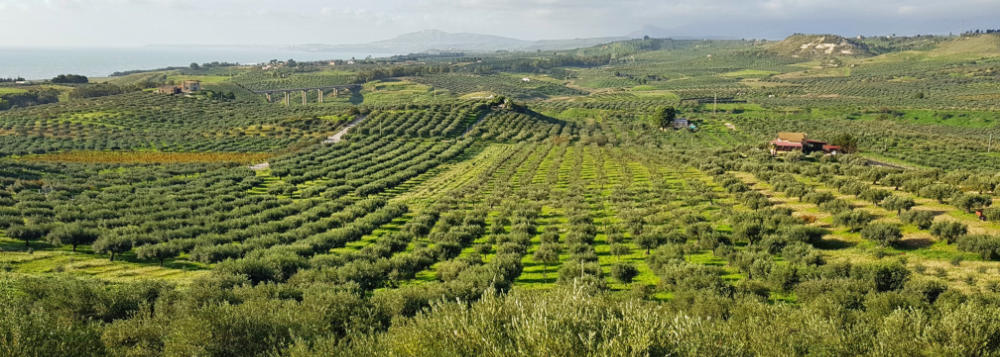
The 5 Original Phases of the RibEVO Protocol
1. Natural Fertilization and Cultivation
Ribera is a truly fertile oasis of production.
The soil is composed of marl and limestone clays, rich in minerals.
As a result, the plants can thrive with natural, self-produced fertilizers.
These nutrients result in olives that are more aromatic and flavorful than those from other regions, but most importantly, they ensure that the fruits remain 100% natural.
The precious qualities of the soil are complemented by a unique local microclimate and exceptionally pure air. The constant presence of a gentle breeze keeps the plants well-ventilated, naturally reducing the spread of diseases.
On our land, we are fortunate to cultivate an ancient and prized native Sicilian variety, known as Biancolilla, which originates and thrives specifically in Ribera and a few neighboring towns.
Aulivus is therefore an extra virgin olive oil produced exclusively from single-variety Biancolilla olives, free from the influence of olives from other regions.
For this reason, Aulivus is a 100% original Sicilian oil.
During our cultivation process, which respects the cycles of nature and the lunar phases, our expert hands inspect each individual plant to ensure the health of the olive trees and to prevent any potential attacks from pathogens that could harm both the plants and the olives.
2. Selection and Manual Harvesting
The harvest of the fruits from our olive groves is carried out strictly by hand, without the use of invasive machinery and only when the olives have reached the perfect level of ripeness.
Not before.
During this stage, we lay long tarps on the ground around the trees and, with the help of combs, gently brush and move the leaves to carefully collect the fruits, letting them fall onto the nets below.
Although this method is slower compared to using machinery, it allows us to select only the best olives, leaving any damaged drupes on the trees.
This careful selection process ensures that we produce oil of superior quality, retaining its maximum beneficial properties.
Once collected, the olives are placed in shaded, ventilated plastic crates to prevent crushing of the drupes, which could trigger fermentative processes leading to “heat,” a defect that increases the oil’s acidity and alters its organoleptic properties.
3. Cold Extraction
Within a few hours of harvesting the olives, we bring them directly to the mill.
Here, after undergoing various processes of washing, leaf removal, crushing, and malaxing, the oil is finally extracted.
Throughout these stages, the temperature of the paste never exceeds 27°C.
This is because we use a cold extraction process.
We rely on state-of-the-art milling equipment that maintains a low, constant temperature and operates in an oxygen-free environment.
The absence of oxygen prevents oxidation of the paste and simultaneously helps preserve the organoleptic properties of the extracted oil.
4. Natural Decantation and Transfer
After the extraction process, the oil still contains fragments and particles of olives suspended in it, which include aromatic and phenolic compounds.
At this stage, producers typically fall into two main categories: those who filter and those who do not.
Filtering the oil removes these residues, which over time could ferment and spoil the flavor and aroma of the oil.
However, this process also results in the loss of many polyphenols and nutrients present in the oil.
On the other hand, those who do not filter produce a raw oil containing suspended particles rich in antioxidants, but these particles can settle at the bottom over time, potentially fermenting and compromising the oil’s quality.
To ensure we provide our customers with a unique and exceptional product, my family and I have chosen a third method called “Natural Decantation and Transfer.”
Essentially, after extracting the oil, we do not filter it. Instead, we place it in stainless steel tanks where it naturally decants over time without any filtration. This allows all suspended particles to settle at the bottom.
Afterward, we draw the oil from the top, leaving the residues at the bottom, and transfer it to other tanks from which it will be drawn for final packaging.
This technique is certainly more labor-intensive and requires more time and effort, but it is the only method that allows us to produce oil that retains 100% of its aromatic components and polyphenols, unlike filtered oil, while avoiding the sedimentation issues of unfiltered oil.
5. Bag in Box packaging
This is the final stage of our “Ribevo” protocol.
After decantation and transfer, the oil is ready to be packaged.
One of the most important choices affecting its preservation is the type of packaging used.
To maintain the oil’s characteristics, it is crucial to store it:
- In a cool, dry place
- Away from oxygen
- Away from light
- Away from heat sources
The two key factors that the container can influence are:
- Protecting the oil from oxygen
- Protecting the oil from light
As you may have noticed, the most commonly used containers for EVO oil are glass bottles and metal tins.
However, both have significant drawbacks.
Firstly, glass bottles, despite using dark materials for packaging, are still subject to light exposure.
Additionally, the cost of glass, labels, and caps increases the final purchase price, making it higher compared to other types of packaging.
Metal tins, on the other hand, present another major issue.
Once opened, the oil is in constant contact with oxygen, which accelerates the oxidation process. Over time, this depletes the oil’s organoleptic properties and antioxidants, causing it to become rancid and metallic.
So, metal tins and glass bottles? No, thanks—not for our oil.
For these reasons, we have chosen to use a completely different and innovative packaging: our Bag-in-Box.
BAG IN BOX: what is it?
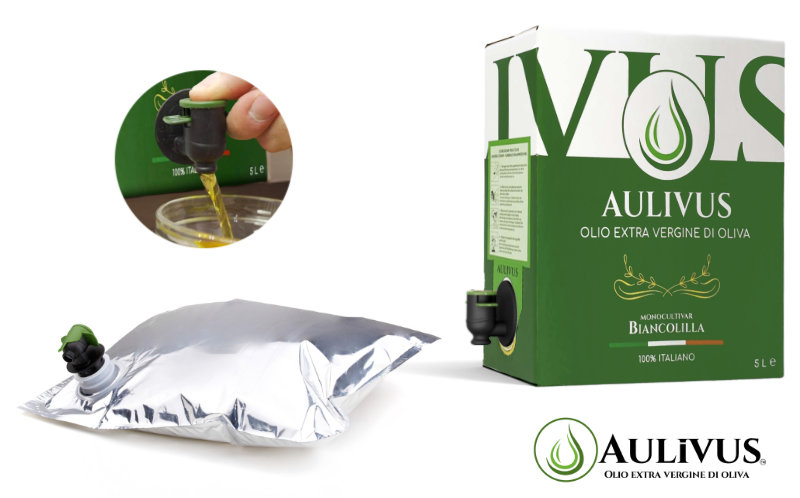
The Aulivus Bag in Box is a tree-piece container:
- An inner bag made from food-grade multilayer material that protects the oil from light and contact with oxygen in the air, preventing oxidation.
- An outer box made from sturdy cardboard that shields the oil from temperature fluctuations and the dents typically associated with metal containers.
- A dispensing tap that allows for easy pouring without getting your hands dirty and effectively eliminates waste, allowing you to enjoy every last drop.
This state-of-the-art packaging protects the oil from light, air, and oxidation, preserving its organoleptic qualities intact.
Our Bag in Box and its 6 Advantages
Let’s analyze its 6 advantages in detail.
1. High Oil Protection
Recent scientific studies have shown that the sealed bag inside the Bag-in-Box effectively protects the oil from both light and air, thereby preserving it from oxidation.
The inner bag is vacuum-sealed and compresses as oil is dispensed through the convenient tap, which is equipped with a special valve that prevents air from flowing back in.
This ensures that the oil remains completely isolated from oxygen.
2. Greater convenience and cleanliness
Unlike pouring oil from a metal tin, our Bag-in-Box eliminates drips and keeps everything clean.
Thanks to the handy tap, the Bag-in-Box facilitates a clean and practical transfer of extra virgin olive oil directly into your serving container.
3. Robust and Durable Packaging
With a very solid and sturdy cardboard structure (comparable to a tin), the Bag-in-Box does not deform, dent, or rust.
4. Protection from Thermal Shock
The thickness of the outer cardboard protects the oil from temperature changes, preserving its original organoleptic qualities.
5. No Waste to the Last Drop
When you notice the oil is running low, you can open the outer box and squeeze every last drop from the inner bag, ensuring no waste.
6. Beautiful to look at (and give as a gift!)
The Bag-in-Box is practical, easy to handle, transport, and store neatly, and it is also aesthetically pleasing (making it a great gift!).
Our oil, with its medium-light fruitiness, is rich in aromas with floral and vegetal notes, and each drop showcases the wonderful flavors typical of Sicily.
Despite its Sicilian character, this oil is delicate and elegant—it enhances, rather than overpowers, the flavors of ingredients, making it not only delicious but also highly digestible.
All this is preserved in the convenient and practical Bag-in-Box.
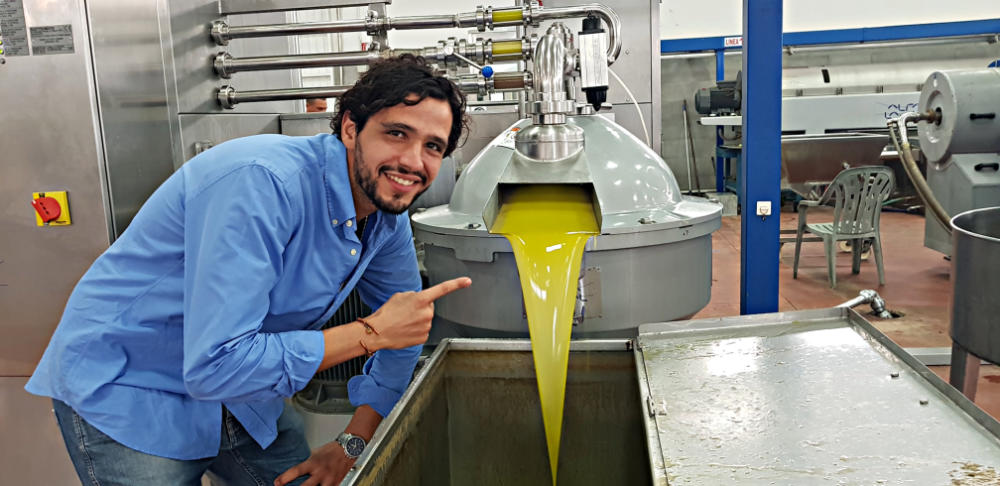
What People are saying about Aulivus Oil ?
In October of last year, with the help of the Internet, I started selling Aulivus Oil throughout Italy and received an overwhelmingly positive response.
Indeed, the positive feedback came quickly.
Here are a few examples:


In addition to customer messages, we’ve also started receiving awards and recognitions, such as those from Gambero Rosso and Slow Food, who have included Aulivus in their guides to the best oils in Italy.
But the next positive message I want is yours!
If you want to ensure you’re serving an excellent and exquisite 100% Sicilian extra virgin olive oil, you absolutely must try Aulivus!
It is an EVO OIL selected by

and by


Aulivus, our Biancolilla monocultivar oil has been selected and included in the prestigious guide “Oli d’Italia 2023” by Gambero Rosso and in the “Guida agli Extravergini 2023” by Slow Food Italia.
Two important awards that testify to the goodness and high quality of our Biancolilla extra virgin olive oil !
How can You try and Get Aulivus Oil delivered right to your home?
Let’s quickly recap:
Aulivus is a genuine extra virgin olive oil made 100% from Sicilian olives:
- The result of the love and dedication of a family-run business
- Produced following all the stages of the RibEVO Protocol
- Made from Sicilian olives harvested exclusively by hand
- Pressed from Biancolilla olives grown in mineral-rich soil
- Cold-extracted using the latest extraction technologies
- With an acidity level very close to zero (acidity always below 0.3%)
- Purified through natural decantation (no filtering)
- Rich in numerous health benefits
- Packaged in Bag-in-Box directly at the mill at the time of shipping
- Shipped to your home without any intermediaries
Do you really want to keep buying a “generic” (and likely inferior) “olive oil” from the colorful shelves of your usual supermarket, without knowing for sure where it comes from, how it was produced, and, most importantly, what it actually contains!?
OR
Don’t you think it’s worth trying AT LEAST ONCE a TRUE AND PURE Italian Extra Virgin Olive Oil, made from olives grown in a Sicilian olive grove like the one you’ve just imagined??


...and what if I order and try Aulivus and then I don't like it?
I’m confident that Aulivus won’t disappoint you, and once you taste it, you’ll finally understand and appreciate the true flavor of a single-varietal extra virgin olive oil.
However, tastes are personal, and it’s possible that Aulivus might not be to your liking.
No worries! You don’t need to hesitate.
You absolutely shouldn’t miss the chance to try it because when you purchase Aulivus, you’re covered by our special “100% Satisfaction or Your Money Back” guarantee.
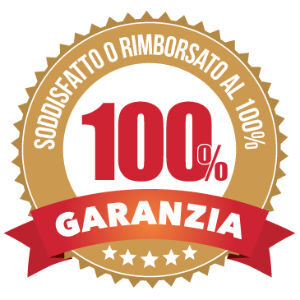
100% Satisfaction or Your Money Back Guarantee
What does it mean? Let me explain right away.
You order Aulivus, receive it directly at your home, and enjoy it with your favorite dishes at your leisure.
If for any reason you’re not satisfied with the oil, just let me know, return the unopened containers, and you’ll get EVERY cent of your purchase price back!
Yes, you read that right: if Aulivus isn’t to your liking, I’LL GIVE YOU A FULL REFUND!
Have we gone crazy? No, absolutely not!
I just want you to understand that Aulivus is an exceptional oil, and you have no reason not to try it.
My family and I know exactly how good it is (as confirmed by all our customers), so we’re willing to take the risk for you.
Order it, try it, and choose to treat yourself well.
If you don’t like it, at least you’ve tried it, and you’ll get back the full amount you spent.


Home delivery Across Europe
Order your Aulivus and you’ll receive it via courier in a carefully designed package that ensures our premium oil arrives intact at your home within 3-4 days!


...and if you still have any doubts...
take your phone and send a message to the number below:
I, Giorgio Marretta, will personally respond and provide you with all the information you need about Aulivus.
Thank you


You should know that...
This year, global production of extra virgin olive oil for the 2024/2025 season has dropped by 50%.
The demand far exceeds the supply worldwide.
Therefore, the oil produced will not be enough to meet all the requests, and a genuine “rush for oil” is underway, similar to what happened last year.
Due to the scarcity of product, prices have risen, and it is no longer possible to find genuine high-quality extra virgin olive oil for less than €20 per liter (I assure you this as a producer, expert, and well-informed individual).
This year, any oil priced below this amount is likely adulterated and mixed with seed oils and other impurities fraudulently sold as “extra virgin,” and it contains very little actual olive oil.
Don’t risk being left without (REAL) olive oil; it’s crucial for your health!
Unfortunately, math is not a matter opinion,r and at least half of people will be forced, knowingly or unknowingly, to consume foreign and counterfeit oil.
So, I recommend you act quickly and secure your stock of genuine olive oil right away!
Below, you can find the answers to the most frequently asked questions we receive from those who, like you, are considering purchasing and trying our Aulivus Extra Virgin Olive Oil.
If you need more information, don’t worry!
You can always contact us without any obligation by phone or WhatsApp:
We only sell oil from the year of production, we never have oils from previous years, because being small producers we quickly finish our supplies. Our oil for sale is always a fresh oil!
No, unlike other types of oil on the market, such as those from second pressings, simple olive oils, or seed oils, our extra virgin olive oil is extracted directly from the olives using only mechanical processes. No chemicals are used, which is why it can be compared to a freshly squeezed olive juice.
Certainly!
We monitor every stage, from growing the olives on our farms to extraction at the mill using state-of-the-art machinery. This advanced equipment allows for cold extraction, ensuring that the oil retains all its antioxidant components and unaltered organoleptic properties.
The olives are produced directly from our family-owned olive groves located in Ribera (Ag) and Calamonaci (Ag) – Sicily, Italy.
Our Aulivus oil showcases one of Sicily’s oldest and most prized native olive varieties, the Biancolilla. We exclusively produce a pure single-cultivar “Biancolilla” oil. It offers a refined taste that is smooth and not overpowering. Available in various sizes.
Sensory Profile: Medium-light fruitiness.
Olfactory Profile: Rich in aromas, with floral and vegetal notes of fresh grass and green olive.
Taste Profile: Initially, it gently envelops the palate with hints of tomato, artichoke, and fresh almond. The finish is spicy with subtle, yet distinctive, bitterness and pepperiness.
Aulivus is a well-balanced oil that enhances the flavors of your dishes without overwhelming them.
No, our Aulivus oil is not acidic.
It is a common misconception to confuse the oil’s acidity with its bitterness and spiciness. In reality, according to international olive oil guidelines, bitterness and spiciness are positive attributes that highlight the presence of antioxidant compounds beneficial to health.
Acidity cannot be detected by taste but can only be measured through chemical analysis.
It’s important to note that as a preservative, olive oil does not have a strict expiration date. However, to maintain all its properties, it is best consumed within 18 months from production. After this period, while still edible, it may lose some of its nutritional and organoleptic qualities.
Certainly. Thanks to the naturally mineral-rich soil, our olive trees do not require chemical fertilizers. The constant presence of wind helps keep the plants healthy and disease-free, allowing us to avoid harmful chemicals and pesticides. This enables us to produce a truly artisanal and natural oil.
No, we do not filter our oil. Instead, we use natural decantation followed by transfer, which preserves the polyphenol content that would otherwise be lost through filtration.
You can order Aulivus through our online shop, by a simple phone call, or by sending a WhatsApp message to +39 327 58 48 796.
Our service is a direct producer-to-consumer model that shortens the supply chain and ensures quality.
Once we receive your order, we bottle the oil, package it, and ship it via courier (usually on Mondays and Tuesdays to ensure delivery within the week).
Shipping typically takes 3-4 business days, which is met in 97% of cases by the courier. H
owever, unforeseen circumstances might extend delivery times, such as recipient refusal, address changes, access issues, weather conditions, incorrect addresses, incomplete orders, holiday periods, COVID-19, recipient absence, temporary stock shortages, or special preparation requirements.
Despite these potential delays, we strive to ensure timely deliveries.
- Secure Packaging: Our packaging ensures that your order will arrive intact and without any dents or damage.
- Satisfaction Guarantee: If the oil does not meet your expectations upon tasting, we will arrange for a return with our courier and refund all your money.



Az. Agricola Michelangelo Pasciuta - Via Brunelleschi, 33 - 92016 RIBERA (AG) - SICILIA, ITALIA - info@olioaulivus.it
P.IVA: 00663370849 - © Copyright 2025 - privacy policy - cookie policy - condizioni generali di vendita - Cookie
This Website is not a part of Facebook or Facebook Inc. Additionally, this site is NOT endorsed by Facebook in any way. Facebook is a trademark of Facebook Inc.
Questo sito non fa parte di Facebook o Facebook Inc. Inoltre, questo sito NON è approvato da Facebook in alcun modo. Facebook è un marchio registrato di Facebook, Inc.


